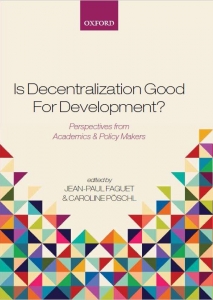This Wednesday (2 December) we’re launching a new book “Is Decentralization Good for Development?” at the LSE (6:30pm, Hong Kong Theatre). This is a public panel discussion so all interested are warmly invited to join!

Ahead of this the book’s author Professor Jean-Paul Faguet gives us a preview of the argument put forward in the book.
Over the past few weeks, many people have asked me “Is decentralization good for development?” So I thought I should answer:
YES.
A slightly more nuanced view
 Is decentralization good for development? It’s always good to begin by defining key terms. Let’s define ‘development’ as increasing human well-being and freedom. What exactly do we mean by ‘decentralization’?
Is decentralization good for development? It’s always good to begin by defining key terms. Let’s define ‘development’ as increasing human well-being and freedom. What exactly do we mean by ‘decentralization’?
You might think that’s the easier question, but weirdly it isn’t. Not because ‘development’ is simple, but rather because there is far less agreement about what exactly decentralization means, and also less attention given to it. As a result, people employ it – often forcefully – in significantly different ways.
Misunderstandings of decentralization are both obvious and subtle. Let’s start with the obvious. Decentralization does not mean the abolition of central government. It does not mean the transfer of all functions to regional or local governments. For the most part, it does not even mean the complete transfer of any service to subnational governments.
Put so plainly, such a corrective sounds unnecessary. Who would argue that we don’t need central government? I’ve been working in this field for 20 years, and I don’t know anyone serious who promotes decentralization understood in any of these ways. But oddly, many of those who argue against decentralization focus their firepower on an enemy that, on closer inspection, looks surprisingly like a straw man.
So let me say it clearly. Decentralization does not eliminate central government. Decentralization does not eliminate the important, continuing role of central government in the provision of most local public services. With the exception of some very local services with few or no economies of scale, like rubbish collection, the center will continue to be involved in local service provision, even after radical decentralization, in important ways.
What decentralization does, rather, is to empower (or create) subnational governments by devolving significant resources and authority to them. It makes the provision of local, regional, and national public services the joint responsibility of two or more levels of government. It transforms a simple, linear system of bureaucratic fiat (think command and control), run from the capital, into a much more complex system of coordination, cost sharing, and overlapping responsibilities amongst multiple tiers of autonomous government with independent mandates.

The downside of increasing complexity is greater cost. But the upsides are potentially far more important. One is the greater robustness of a multitiered system of independent nodes to failure in any one of its parts. Imagine you live in a centralized country, a hurricane is coming, and the government is inept. To whom can you turn? No one – you’re sunk. In a decentralized country, ineptitude in regional government implies nothing about the ability of local government. And even if both regional and local governments are inept, central government is independently constituted, probably run by a different party, and may be able to help. Indeed, the very fact of multiple government levels in a democracy generates a competitive dynamic in which candidates and parties use the far greater number of platforms to outdo each other by showing competence, and project themselves hierarchically upwards. In a centralized system, by contrast, there is only really one – very big – prize, and not much of a training ground on which to prepare.
Macro vs. Micro-Information
 Another key advantage is the greater, more detailed information that decentralized government should be able to bring to bear on any public problem, no matter how small. To better understand this, consider the types of information required to solve any public problem, or provide any high-quality public service. One kind, of course, is technical expertise. Planning a vaccination campaign, designing an irrigation system, and building a water treatment plant are nontrivially complex problems. I could not do any of these things competently myself, and my guess, dear reader, is neither could you. They require specialized knowledge that relatively few people have. Such people tend to cluster in cities, not towns or villages. They tend to work for central government, where the pay is better and the challenges more interesting. Accordingly, central government has an important advantage in the different sorts of technical expertise required for effective service provision.
Another key advantage is the greater, more detailed information that decentralized government should be able to bring to bear on any public problem, no matter how small. To better understand this, consider the types of information required to solve any public problem, or provide any high-quality public service. One kind, of course, is technical expertise. Planning a vaccination campaign, designing an irrigation system, and building a water treatment plant are nontrivially complex problems. I could not do any of these things competently myself, and my guess, dear reader, is neither could you. They require specialized knowledge that relatively few people have. Such people tend to cluster in cities, not towns or villages. They tend to work for central government, where the pay is better and the challenges more interesting. Accordingly, central government has an important advantage in the different sorts of technical expertise required for effective service provision.
But service provision also requires what Elinor Ostrom called “time-and-place information”, meaning location-specific geographic, social, and economic characteristics pertinent to both the underlying problem and potential solutions. Such micro-information must be incorporated into service provision if services are to be both efficient and effective. When and where can the targets of a vaccination drive best be reached? Which local organization might be capable of managing an irrigation scheme? How are local sewerage needs likely to grow and change in the future? Information of this sort is crucial to the success of a public project. But it does not reside with central government, which has weak incentives to acquire it. It resides naturally with local government, which has much stronger incentives to find it out and act on it.
The genius of a properly designed decentralization system is that it combines technical expertise from above with local time-and-place information from below, in a way that is superior to what either level of government could achieve on its own. This flows naturally from central and local officials’ independent incentives, operating through their parties and career aspirations. The result is greater public-sector efficiency, effectiveness, and faster development.
Information and public sector robustness have strong implications for some of the broadest, most important, problems facing developing countries today, such as political instability, macroeconomic instability, secessionist movements and the threat of civil war, elite capture and clientelism. The book discusses decentralization’s effects on each of these issues in great detail. The panel will no doubt thrash many of them out this Wednesday.
Do you really believe in democracy?
Lastly, the question of democracy. These days, most people pledge allegiance to it. So consider this: Who should decide on local services that mainly affect the residents of a particular locality? Elected officials in that place, or elected officials in the capital? Officials elected by the affected residents, or officials elected by the entire nation?
I have heard colleagues declare their allegiance to both democracy and the centralized state, and I just don’t get it. Citizens must be allowed to vote… but only for national government? They must not be allowed local governments? Local services with few externalities – like local policing or primary education – whose effects are overwhelmingly concentrated on the residents of a locality… must be provided by a distant central government? Someday maybe someone will succeed in explaining this view to me. But for now – after 20 years of studying and thinking about it – it seems arbitrary, incoherent, and wrong. You either believe in democracy or you don’t. If you really do, and if locally-specific services exist, then you must believe in local democracy too.
If you’d like to learn more on this subject the following are a good source of information on these issues:
1. Faguet, J.P. and C. Pöschl (eds.). 2015. Is Decentralization Good for Development? Perspectives from Academics and Policy Makers. Oxford: Oxford University Press.
2. Faguet, J.P., A. Fox and C. Pöschl. 2015. “Decentralizing for a Deeper, More Supple Democracy.” Journal of Democracy, 26 (4): 60-74.
3. Faguet, J.P. 2014. “Can Sub-National Autonomy Strengthen Democracy in Bolivia?” Publius: The Journal of Federalism, 44(1): 51-81.
4. Channa, A. and J.P. Faguet. 2012. “Decentralization of Health and Education in Developing Countries: A Quality-Adjusted Review of the Empirical Literature.” LSE/STICERD Working Paper No. EOPP 38.
5. Faguet, J.P. 2004. “Building Democracy in Quicksand: Altruism, Empire and the United States.” Challenge: The Magazine of Economic Affairs, 47: 73-93.





